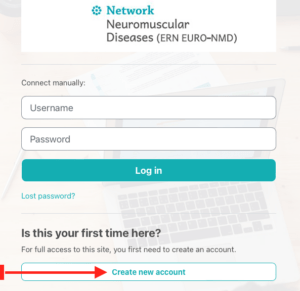Welcome to the EURO-NMD Academy: Where Neuromuscular Disorders Education is Revolutionized! Our cutting-edge platform, powered by the renowned Moodle Learning Management System (LMS), empowers you to stay ahead in your practice. Designed by leading experts, our immersive online courses are perfect for medical professionals, students, and researchers looking to enhance their knowledge and skills. At EURO-NMD Academy, we offer expert-led courses to provide in-depth insights and the latest advancements in diagnosing and treating neuromuscular disorders. Led by world-renowned specialists, our curriculum is carefully crafted to keep you at the forefront of this ever-evolving field. Choose EURO-NMD Academy for unparalleled education, and stay ahead in your practice today!
What is the EURO-NMD Academy’s target audience?
The EURO-NMD Academy delivers courses that are addressed to healthcare graduates, including post-graduate medical students and medical residents, general practitioners and different medical specialities and healthcare professionals (adult and children neurologists, neuro-myologists, neuro-imaging specialists, epileptologists, paediatrics, internal medicine specialists, ophthalmologists, geneticists, nurses, dieticians, pharmacists, biologists, biochemists and rehabilitation specialists).
How do I enrol in EURO-NMD Academy’s courses?
In order to enrol in the courses, you need to gain access to the EURO-NMD Academy platform by creating a new account (https://euronmd.lilicampus.com/)

After creating a new account, please enrol in the Courses available on EURO-NMD Academy, currently the Mitochondrial Disorders Course:

Introducing the Mitochondrial Disorders Course
The Mitochondrial Disorders Course is a joint initiative of the European Reference Networks EURO-NMD (Rare Neuromuscular Disorders), ERN-RND (Rare Neurological Disorders) and ERN Epicare (Rare Epilepsies). This course comprises six modules dedicated to filling a gap in post-graduate education on Mitochondrial Disorders. The latter may arise from the complexity of Mitochondrial Disorders articulated with the multidisciplinary approach to their manifestations and treatment. As a consequence, education about mitochondrial disorders suffers from the fragmentation of their multisystemic nature across diverse medical areas, raising the need for a holistic vision of these patient’s conditions.The current course brings together the perspectives of different neurological areas for the care of neurological and neuromuscular presentations of these patients.
The recent consensus about the management of mitochondrial epilepsies is an example of a sectorial development that needs to be disseminated widely since the care of epilepsy in these patients has specificities that are still insufficiently known among healthcare professionals.
In the current course these knowledge gaps are specifically addressed and part of the evaluation system put in place to document the achievement of the desired educational outcomes.
Mitochondrial Disorders Course Faculty
This course was developed with the active collaboration and support from a diverse Faculty from the 3 ERNs involved.
The core members of the Mitochondrial Disorders Course Faculty are:
Chiara La Morgia
May Yung Tiet
Mitochondrial Disorders Course Learning Objectives
Mitochondrial Disorders Course Workload
The learners will have to read through the proposed readings in preparation for watching a 1-hour webinar with a presentation of around 50 minutes followed by a 10-minute Q&A. The module’s final questionnaire will access the globality of knowledge collected from the suggested readings and the webinar contents. Questions are oriented by a practical approach to the management of these conditions to optimize patients’ results. The module will take the participant an average of 2-3 hours to complete, depending on their previous familiarity with the subject. A total investment of 12 to 18 hours will be required to pass all six modules successfully.
Target Audience
This course is addressed to courses that are addressed to healthcare graduates, including post-graduate medical students and medical residents, general practitioners and different medical specialities and healthcare professionals (adult and children neurologists, neuro-myologists, neuro-imaging specialists, epileptologists, paediatrics, internal medicine specialists, ophthalmologists, geneticists, nurses, dieticians, pharmacists, biologists, biochemists and rehabilitation specialists).
Enrolment
Assessment
Learners should complete a questionnaire of 4 questions for each module (a total of 24 questions for the 6 modules) and achieve an approval rate of 75%. Multiple trials are allowed for each of the modules, and the learners can follow whichever order suits them best. This evaluation validates the learning objectives established for this course and allows certification of the educational activity.
Participants Feedback
At the end of each module, participants are invited to provide feedback regarding its contents.
Certification
At the conclusion of all the modules, participants may require a certificate from the organizers.
Mitochondrial Disorders Course Legarl and Ethical Conformity Declaration
The current Course adheres to legal and ethical requirements in place
Creation date and versions
This course was created on February 2024 with webinars delivered through the previous year and supporting publications selected by the Faculty.
The Moodle platform of EURO-NMD is accessible through the url: https://euronmd.lilicampus.com/ .
Once on the login page, create an account by clicking the bottom right button.
Technical requirements: the course is delivered through a Moodle-cloud platform. This allows to follow the course in most browsers in a computer connected to the Internet.




